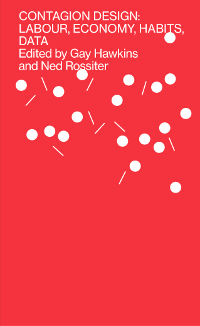Contagion Design: Labour, Economy, Habits, Data
edited by Gay Hawkins and Ned Rossiter

- Low Latencies
- Published: 2021
- ISBN: 978-1-78542-118-1
- PDF ISBN: 978-1-78542-117-4
How is contagion designed? How do labour, migration, habits and data configure contagion? Analyzing the current conjuncture through these vectors, this book critically addresses issues of rising unemployment, restricted movement, increasing governance of populations through data systems and the compulsory redesign of habits. Design logics underscore both biological contagion and political technologies. Contagion is redesigning how labour and migration are differentially governed, experienced and indeed produced. Habits generate modes of exposure and protection from contagion and become a resource for managing biological and social life. Data turns contagion into models that make a virus actionable and calculable. New modes of sociality and collaboration provoke forms of contagious mutuality. But can the logic of pre-emption and prediction ever accommodate and control the contingencies of a virus? Taken as a whole, the essays in this small book explore these issues and their implications for cultural, social and political research of biotechnical conditions. If contagion never abandons the scene of the present, if it persists as a constitutive force in the production of social life, how might we redesign the viral as the friend we love to hate?
Editor Bios
Gay Hawkins is a Professor of Social and Cultural Theory at the Institute for Culture and Society, Western Sydney University. She researches in the areas of environmental humanities, political materials, markets and STS.
Ned Rossiter is Director of Research at the Institute for Culture and Society, and Professor of Communication, School of Humanities and Communication Arts, Western Sydney University. His current book projects include Media of Decision and (with Soenke Zehle) The Experience of Digital Objects: Automation, Aesthetics, Algorithms.
